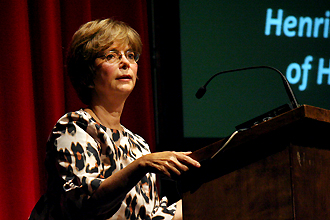Ethics and the cells that changed medicine
The new class of Tulane undergraduates tackled a heavy topic for this year's Tulane Reading Project, learning about ethics, race and medicine in The Immortal Life of Henrietta Lacks by Rebecca Skloot. Bioethicist Ruth Faden came to Tulane on Tuesday (Oct. 4) to give the students insight into the issues behind the words.

Ruth Faden of Johns Hopkins, speaking in Dixon Hall, talks about the medical ethics surrounding the treatment of Henrietta Lacks and her family. (Photo by Claire Barry)
Faden, director of the Johns Hopkins Berman Institute of Bioethics, gave the Reading Project keynote speech. She discussed the story of Lacks, a poor black woman who died of cervical cancer in 1951 after treatment at Johns Hopkins Hospital, where, unbeknownst to her, scientists took a specimen of her cervix. Research based on those retrieved cells would change the face of medicine forever.
Faden spoke about Lacks, her cells and the debatable ethics behind the cells' acquisition and subsequent distribution. She gave specific consideration to the ethics of how poorly Lacks' family lived despite the millions being made on her cells by the biomedical industry.
“Hold the two terms 'consent' and 'compensation' in your minds,” Faden said. “These are the two most important and unresolved themes of the conflict surrounding the story of Henrietta Lacks, and they most certainly are not independent of the wider considerations of social justice.”
Faden talked about Lacks' experience at Hopkins, the only nearby hospital treating blacks at the time, and focused on morally complex issues surrounding the case.
“Sadly, her scientific legacy will always overshadow her much more important human one,” Faden concluded.
Benton Oliver is a first-year student majoring in communication.
